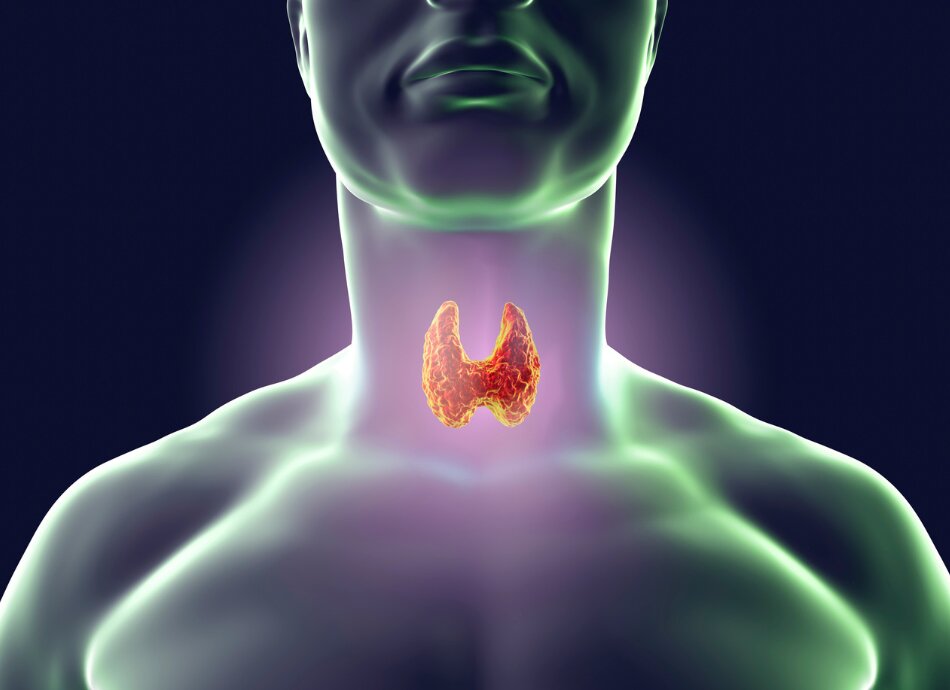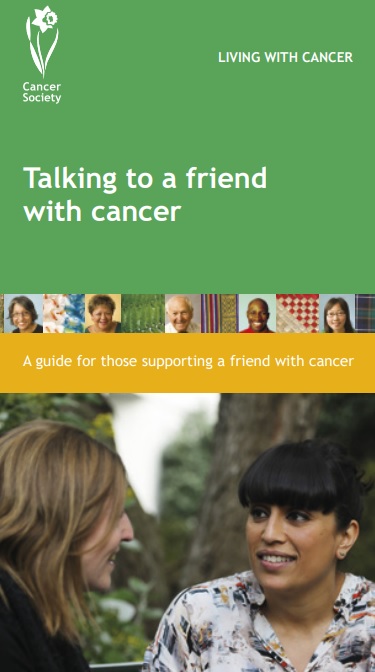Thyroid cancer
Key points about thyroid cancer
- Thyroid cancer is a type of cancer that can develop in your thyroid, a gland in the front of your neck.
- Thyroid cancer can occur at any age. It affects women far more than men, and is more common among Pacific Peoples in New Zealand.
- You are more at risk if you have been exposed to radiation, have a family history or certain genetic conditions, are obese or have had goitre.
- Symptoms include a lump in your neck, but this is common and is most often not cancer. Other signs are trouble with swallowing or breathing, a hoarse voice and swollen glands (lymph nodes) in your neck.
- There are a range of treatment options and survival rates for people with thyroid cancer are very high.

The thyroid is a butterfly shaped gland that sits at the front of the neck. It produces hormones (T3 and T4) that are important in controlling your body’s metabolism and calcitonin, a hormone involved in controlling your calcium levels.
Cancer can start in the ‘follicular cells’ that produce and store T3 and T4, known as follicular or papillary thyroid cancer, or from the ‘parafollicular cells’ that produce calcitonin, known as medullary thyroid cancer. Another form of thyroid cancer is called anaplastic and this is quite rare. The most common is papillary thyroid cancer, accounting for about 80% of all thyroid cancers.
Thyroid cancer can occur at any age and it affects women far more than men. The incidence has increased but some of this is due to improving radiological imaging such as ultrasound scans which has led to the detection of smaller often insignificant thyroid cancers. Thyroid cancer is more common among Pacific Peoples in New Zealand.
Anything that can increase your risk is called a risk factor. Having one or more of these risk factors does not mean that you will develop thyroid cancer. Even if you have no risk factors you could still develop thyroid cancer.
Risk factors include:
Thyroid cancers usually develop slowly without any obvious symptoms. The following signs and symptoms can be experienced but they also occur in conditions that are not thyroid cancer:
- painless lump in your neck
- trouble swallowing or breathing
- change to your voice, eg, hoarseness
- swollen glands (lymph nodes) in your neck.
A thyroid lump may be a typical sign of a cancer but thyroid lumps are very common and not cancerous in approximately 9 out of 10 cases. An under-active thyroid or over-active thyroid is not a symptom of cancer.
Examination of the thyroid involves feeling your neck. Attention is paid to the size and firmness of the thyroid and to identify any enlarged lymph nodes.
Blood tests are not used to diagnose thyroid cancer but help to work out if your thyroid is working normally. Tests are likely to include levels of T3, T4, TSH (hormone that stimulates your thyroid) and calcium. Thyroglobulin (a protein produced by the thyroid gland related to T3 and T4), calcitonin and CEA (a type of tumour marker) may be measured, as these can be useful for monitoring response to treatment or if your cancer returns after treatment.
An ultrasound will be performed because this helps determine if any lumps felt are solid or filled with fluid. Solid lumps are more likely to be cancerous. The ultrasound can also be used as a guide to obtain a biopsy of a lump (taking a small amount of tissue to look at under the microscope) if it is too small to be felt.
A biopsy called a fine needle aspiration (FNA) is usually performed. Cells are taken from the thyroid lump using a fine needle and then are looked at by a pathologist. Other investigations sometimes used are CT, MRI and PET scans and laryngoscopy (an examination of your vocal cords).
If you are suspected to have thyroid cancer, you will be referred to a surgical specialist. Both general surgeons and ear, nose and throat (ENT) surgeons are trained to treat thyroid cancer.
The treatment for thyroid cancer depends on the results of the biopsy, the type of thyroid cancer you have, your symptoms and your preferences.
Surgery usually involves complete removal of the thyroid gland. For follicular and papillary thyroid cancers, surgery can be followed by radioactive iodine treatment, especially if the cancer has spread to the lymph nodes or beyond. There is no role for radioactive iodine with medullary thyroid cancer – if this has spread radiation therapy may be used instead.
The most common thyroid cancers have excellent long-term survival. Survival is based on many factors but the 5-year survival for thyroid cancer is 98%.
Apps reviewed by Healthify
You may find it useful to look at some Pain management apps and Self-management and healthy living apps.
The following links provide further information about thyroid cancer. Be aware that websites from other countries may have information that differs from New Zealand recommendations.
Australian and NZ Head and Neck Cancer Society(external link) (Facebook page)
Thyroid gland(external link) Australian and NZ Endocrine Surgeons
Thyroid cancer(external link) NZ Cancer Society
Thyroid cancer(external link) Australian Cancer Council
Apps
Pain management apps
Self-management and healthy living apps
Resources
Questions you may want to ask(external link) Cancer Society, NZ, 2020 Available in the following languages: English, (external link) te reo Māori(external link), Arabic, (external link) Chinese (simplified)(external link), Chinese (traditional)(external link), Cook Island Māori(external link), Hindi(external link), Gujurati(external link), Korean(external link), Niuean(external link), Samoan(external link), Tongan(external link)
Emotions and cancer(external link) Cancer Society, NZ, 2020
Talking to a friend with cancer(external link) Cancer Society, NZ, 2017
Living well with advanced cancer(external link) Cancer Society, NZ, 2020
Brochures

Cancer Society, NZ, 2020

Cancer Society, NZ, 2020
English, te reo Māori, Arabic, Chinese (simplified), Chinese (traditional), Cook Island Māori, Hindi, Gujuratil, Korean, Niuean, Samoan, Tongan

Cancer Society, NZ, 2017
Credits: Used with permission and adapted from content from Te Aho o Te Kahu | The Cancer Control Agency
Reviewed by: Healthify editorial team. Healthify is brought to you by Health Navigator Charitable Trust.
Last reviewed:
Page last updated:





